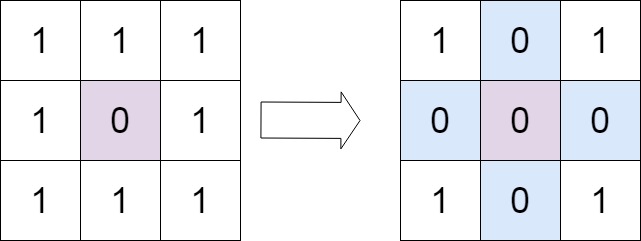Given an m x n integer matrix matrix, if an element is 0, set its entire row and column to 0‘s.
You must do it in place.
Example 1:

Input: matrix = [[1,1,1],[1,0,1],[1,1,1]] Output: [[1,0,1],[0,0,0],[1,0,1]]
Example 2:

Input: matrix = [[0,1,2,0],[3,4,5,2],[1,3,1,5]] Output: [[0,0,0,0],[0,4,5,0],[0,3,1,0]]
Constraints:
m == matrix.lengthn == matrix[0].length1 <= m, n <= 200-231 <= matrix[i][j] <= 231 - 1
Follow up:
- A straightforward solution using
O(mn)space is probably a bad idea. - A simple improvement uses
O(m + n)space, but still not the best solution. - Could you devise a constant space solution?
- The easiest way is create a new m*n matrix to zero the coordinates based on the input.
- O(m + n) is adding a new row and column as flags to indicate whether or not the row or column needs to be zeroed.
- Final solution is constant space solution. The first element of column or row can be an indicator, but the first row or first column may not need to be all zeroed. Therefore, we can have a 2 flags to indicate that.
class Solution:
def setZeroes(self, matrix: List[List[int]]) -> None:
"""
Do not return anything, modify matrix in-place instead.
"""
n = len(matrix)
m = len(matrix[0])
first_row_zero = False
first_column_zero = False
for y in range(n):
for x in range(m):
if matrix[y][x] == 0:
if y == 0:
first_row_zero = True
if x == 0:
first_column_zero = True
matrix[0][x] = None
matrix[y][0] = None
for y in reversed(range(n)):
for x in reversed(range(m)):
if matrix[y][0] is None or matrix[0][x] is None:
if y == 0:
if first_row_zero:
matrix[y][x] = 0
elif matrix[y][x] is None:
matrix[y][x] = 0
elif x == 0:
if first_column_zero:
matrix[y][x] = 0
elif matrix[y][x] is None:
matrix[y][x] = 0
else:
matrix[y][x] = 0

搶先發佈留言